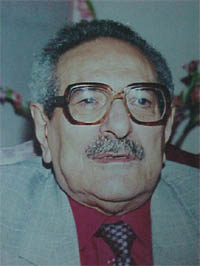Alfred Farag (1929-2005)
By Nehad Seleiha
Born in Alexandria in 1929, Alfred Farag, who died on 4 December, is one of the most eminent playwrights of the post-1952 Revolution period. At Farouk I (later Alexandria) University, Faculty of Arts, he studied English literature which gave him a thorough grounding in Western theatre, an influence that he was to combine in his writings with the resources of the Arabic literary heritage.
After obtaining his BA in 1949, he took up a teaching career, which he eventually abandoned for a post in Al-Gomhouriyya newspaper, while becoming more and more involved in the leftwing activities of the day. His first play, Suqut Fir'un (Fall of Pharaoh, 1955) was not performed before 1957, while his Sawt Misr (Voice of Egypt) was staged in 1956, according to his translator Rasheed El-Enany in the introduction to Farag's The Caravan, Or Ali Janah Al-Tabrizi and His Servant Quffa. But Farag was detained, together with a large number of leftwing writers and intellectuals from 1959 to 1963, and it was in prison that he wrote his play Hallaq Baghdad (The Barber of Baghdad), which was performed by his fellow-inmates and also smuggled out with their help.
The play was staged in 1964, by which time Farag had accepted a state-sponsored scholarship to devote himself to writing for the theatre, later playing an important role in the "mass culture" project of spreading theatrical appreciation in the provinces. 1965, which witnessed the production of his play Sulayman Al-Halabi at the National, was also to bring the first of his awards, the State Incentive Award, to be followed a year later by the Sciences and Arts Medal of the First Order.
In 1973, however, having signed with a number of other writers a statement on behalf of leftwing university students detained by Sadat, Farag was banned from writing in the media and performances of a play of his were discontinued. He therefore chose exile, moving first to Algeria then living for several years in London until the late-1980s. Contributing for many years a weekly column in Al-Ahram, Farag continued to write in several genres and a number of his plays were staged to both critical and commercial success.
Drawing on Brecht in some of his plays, one of his signal contributions, however, was the accomplished reappropriation of the pre-modern Arabic literary heritage for a theatre that was often politically allegorical. This is seen in his use of popular epics, as in his 1967 play Al-Zayr Salim and his many plays inspired by The Thousand and One Nights, including Al-Tabrizi, The Barber of Baghdad, Rasa'il Qadi Ashbilya (The Epistles of the Judge of Seville), and Al-Amira Wal-Su'luq (The Princess and the Vagabond). Farag received the Egyptian State Merit Award in 1993, and in 2002 the Jerusalem Award given by the General Union of Arab Writers



